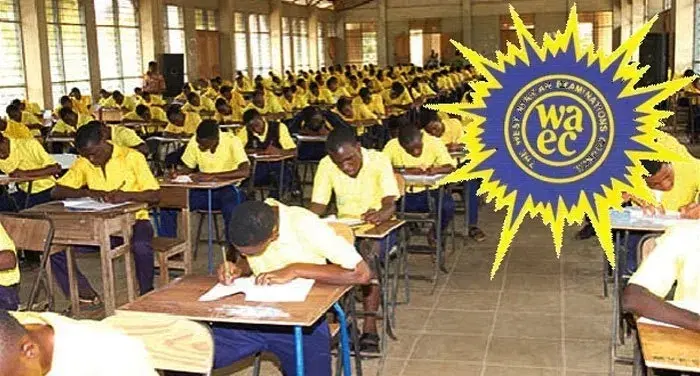The recent decision by the government to impose an 18-year age restriction on students taking the National Examinations Council (NECO) and West African Examinations Council (WAEC) examinations has sparked widespread outrage and condemnation among parents and other stakeholders.
In a country where academic sessions are not guaranteed due to incessant strikes, life expectancy is very short due to malnutrition and inadequate medical facilities, imposing age limit on the harpless parents sounds unreasonable and insensitive, Stakeholders say at various interactions with metrobusinessnews.com. (MBN)
They Further argue that the proposed Policy lacks legitimacy considering the growing discontent among Nigerians, who feel government remembers them only when it’s convenient for them and their associates, stressing that if proper assessment of the present situation and configurations are considered, the leaders would have realised that most of the children in senior classes now are below 15 years
The Minister of Education, Prof. Tahir Mamman, announced on Channels Television’s ‘Sunday Politics’ programme that the Federal Government had instituted a new age policy for secondary school leaving examinations, setting the minimum age at 18.
This means underage candidates will no longer be allowed to sit for the West African Senior School Certificate Examination and the Senior School Certificate Examination, both crucial for advancing to tertiary education.
The directive also affects the West African Examinations Council, which administers the WASSCE, and the National Examinations Council responsible for the SSCE.
Additionally, Mamman confirmed that the age limit to undertake the Unified Tertiary Matriculation Examination, overseen by the Joint Admissions and Matriculation Board, will also be 18.
He added that this was not a new policy.
“For the avoidance of doubt, this is not a new policy; this is a policy that has been there for a long time,” Mamman stated.
“Even basically, if you compute the number of years pupils, and learners are supposed to be in school, the number you will end up with is 17 and a half – from early child care to primary school to junior secondary school and then senior secondary school. You will end up with 17 and a half by the time they are ready for admission.
“So, we are not coming up with a new policy, contrary to what some people are saying; we are just simply reminding people of what is existing. In any case, NECO and WAEC, henceforth, will not be allowing underage children to write their examinations. In other words, if somebody has not spent the requisite number of years in that particular level of study, WAEC and NECO will not allow them to write the examination.”
The minister went further to give a breakdown of the number of years pupils were expected to spend between child care and senior secondary school.
According to him, early care is expected to last for the first five years. Pupils are expected to begin primary one at the age of six, spend six years in primary school and move to junior secondary school at the age of 12, spend three years, before moving to senior secondary school at the age of 15, then spend another three years before leaving for university at the age of 18.
Last month, Mamman, in a meeting with JAMB and other education stakeholders, insisted that the UTME should be set at 18 years.
Mamman stated, “JAMB is hereby notified that there is now a ban on underage students, those under the age of 18, from our tertiary institutions for the 2024 admissions… It doesn’t require a statement of the minister… we are only restating what is in the law.”
However, the law sparked criticisms, particularly from university stakeholders, as many of those categorised as underage candidates had already taken the UTME without anticipating the directive.
This posed a threat to potential 16 and 17-year-olds, who had already passed the UTME and were seeking admission into universities.
Following the disapproval, the minister reversed the directive, allowing candidates from 16 years to be admitted into the university as it previously stood until 2025.
However, following Sunday’s pronouncement, Mamman insisted that there was no going back on the policy.
The minister said, “It is 18 (years). What we did at the meeting that we had with JAMB (in July) was to allow this year and for it to serve as a kind of notice for parents that this year, JAMB will admit students who are below that age but from next year, JAMB is going to insist that anybody applying to go to university in Nigeria meets the required age, which is 18.”
However, some parents and education stakeholders have rejected the policy, saying it will undermine students’ academic progress and limit their future opportunities.
We will go to court — Parents
The Deputy National President of NAPTAN, Chief Adeolu Ogunbanjo, minced no words when approached by Vanguard, saying the body will challenge the matter in court.
“We have spoken to some lawyers on the matter, they said we should just be patient for the year 2025 to roll in. Around March next year, before WAEC and others start to conduct the SSCE, we will sue the government if they refuse to drop the policy. We will go to court because the minister wants to draw education back to the country.
“They simply want to kill knowledge and education in the country. They also want to kill the aspirations of parents to get their wards educated. It will mess up the education sector. Let them just leave the policy at 16 years.
‘’The world has changed and we must change with it. What do they want those who leave secondary school before 18 to do? The policy is simply not in tune with the reality of the times,” he stated.
Leave the age at 17 — CONUA
On his part, the National President of CONUA, Dr Niyi Sunmonu said that his union will only support leaving the age to seek admission for further studies at 17.
“We are reiterating our earlier position. When the minister said early in the year that when he monitored the UTME, he saw some young chaps writing the exam and canvassed pegging the year at 18, we said 17 is okay.
“A student can leave secondary school at 16 or a little above that and seek admission for higher education at 17.
“The minister should call a meeting of stakeholders in the sector to deliberate on it. The policy should go through the process of acceptance by all and even be legislated upon by the National Assembly. Parents want to be free from the burden of educating their children as soon as possible,” he said.
Why the rush? — ASUU
Reacting yesterday, the National President of ASUU, Professor Emmanuel Osodeke, called for obedience to the rules and regulations guiding activities in the sector.
“Let parents do the needful by putting their wards in school at six years. The children would be emotionally mature by 18 when they get to higher institutions.
‘’It is the proliferation of private schools at all levels that is driving opposition to this policy. If the public schools are good for everyone, then those patronising private ones will reduce in number, “ he stated.
ALSO READ:Worries As ASUU Gives 21-Day Ultimatum To Embark On Fresh Nationwide Strike
Asked what would become of gifted children, Osodeke said the number in that category is not high.
“Regarding what those who pass out of secondary school before 18 would do, their parents should be responsible for that. If they rush them to school, they should make arrangements to take care of them before they move on to higher institutions, “ he added.
It is slavery mentality — CPE member
A member of the CPE, Mr. Oladapo Adekoya, described the policy as “modern slavery mentality and approach.”
Adekoya said: “These people are never serious. The real issues they will neglect and keep pursuing shadows. At 18, a young adult should be fully set to launch a career path, if all necessary skills and abilities are properly impacted.
“The curriculums themselves are outdated and practically useless. Let’s concentrate on the issues that matter, then the issue of age on admission will set in automatically.”
We will respond later — WAEC
One of the bodies conducting SSCE, the West African Examinations Council, WAEC, said it will respond later.
Speaking in a chat, the Head of Public Relations, Moyosore Adesina, said: “We have not been informed yet. The Head of National Office will speak on the matter later. You know that WAEC conducts such exam in other West African countries too and Nigeria is not the sole authority over the body.”












